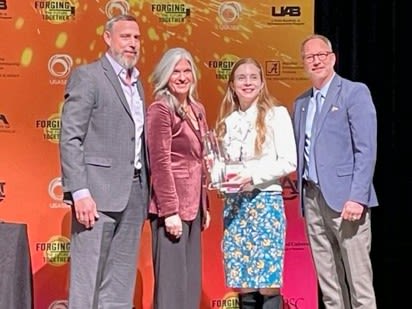SURESM Fire Excellence
SURESM Program Earns Excellence in Pedagogical Innovation Award
The Stimulating Urban Renewal Through Entrepreneurship (SURESM) Program in the Musa and Khaleda Dakri Center for Economic Inclusion at the C. T. Bauer College of Business has been named one of the nation’s leading courses in entrepreneurship education.
SURESM leaders recently accepted the Pedagogical Innovation Award at this year’s United States Association for Small Business and Entrepreneurship (USASBE) conference, which recognizes institutions with creative, high-quality, sustainable and impactful courses in entrepreneurship.

Accountancy & Taxation Professor of Practice Esther Bailey (second from right) accepts the Pedagogical Innovation Award.
Accountancy & Taxation Professor of Practice Esther Bailey (second from right) accepts the Pedagogical Innovation Award.
The program has earned national recognition since its inception in 2012 thanks to its non-traditional class structure. The course steps away from a typical test-based curriculum and gives students hands-on experience consulting local entrepreneurs.
"To get an award for excellence in teaching is amazing,” Robert Grinaker Professor of Accounting, Executive Director of the Dakri Center for Economic Inclusion and Founding Director of SURESM Saleha Khumawala said. “It's an innovative teaching model because we flipped the traditional classroom and its structure. There is no textbook, no exams, it is all immersive learning for our students because they actually work with businesses.”
The SURESM program is a semester-long course where students work as consultants with three to four under-resourced small business owners in the Houston area. Of the hundreds of applicants, 125 entrepreneurs are chosen to participate in the program working with student consultants to bring their business dreams to life.
"Students take all these different courses but this program allows them to apply what they have learned to an actual business which really sharpens their knowledge,” she said. “Not only that, but it sharpens your human skills. They develop the ability to talk with these businesses, listen and understand their needs and develop that human empathy. You cannot learn that in a textbook.”
Khumawala initially worked with small businesses around the country and across the globe in places such as Africa and Mexico before piloting the local program in 2012. She recruited 20 businesses from a church near the University of Houston campus and has continued to improve the program each year since.
“Building the program has been real organic in terms of the curriculum and educational model because our purpose has always been to revise it every year as we learn to improve,” she said. “After all the learning and fine-tuning, the course now meets seven of the United Nations goals for sustainable development.”
The program is continuing to grow on a national scale as multiple schools have adapted similar courses launching on campuses across the country this year.
“Being in this program is a win for everyone involved,” she added. “When these businesses you work with get up and running you can say that you really helped make a difference and that is just an incredible feeling. It’s only in giving that you feel the richness.”
